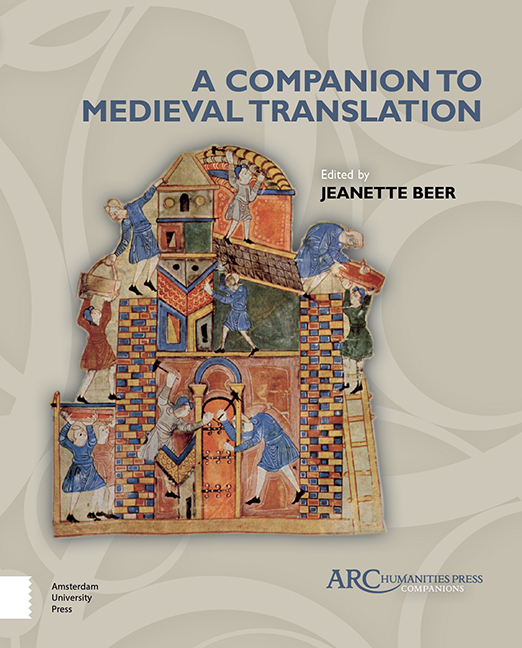Book contents
- Frontmatter
- Contents
- Acknowledgements
- Introduction
- Chapter 1 The European Psalms in Translation
- Chapter 2 The Old French Bible
- Chapter 3 Middle English Religious Translation
- Chapter 4 Bible Translation and Controversy in Late Medieval England
- Chapter 5 Medieval Convent Drama: Translating Scripture and Transforming the Liturgy
- Chapter 6 Translating Romance in Medieval Norway: Marie de France and Strengleikar
- Chapter 7 Christine de Pizan, Translator and Translation Critic
- Chapter 8 Translation, Authority, and the Valorization of the Vernacular
- Chapter 9 Vernacular Translation in Medieval Italy: volgarizzamento
- Chapter 10 Dante and Translation
- Chapter 11 Chaucer and Translation
- Chapter 12 Alchemy and Translation
- Chapter 13 Scientific Translation: A Modern Editor’s Perspectiv
- Chapter 14 Modern Theoretical Approaches to Medieval Translation
- Chapter 15 Observations on Translation by a Thirteenth-Century Maître: Li Fet des Romains
- Epilogue. Observations on Translation by the Oxford Professor of Poetry: Pearl
- General Bibliography
- Appendix
- Index
Introduction
Published online by Cambridge University Press: 20 November 2020
- Frontmatter
- Contents
- Acknowledgements
- Introduction
- Chapter 1 The European Psalms in Translation
- Chapter 2 The Old French Bible
- Chapter 3 Middle English Religious Translation
- Chapter 4 Bible Translation and Controversy in Late Medieval England
- Chapter 5 Medieval Convent Drama: Translating Scripture and Transforming the Liturgy
- Chapter 6 Translating Romance in Medieval Norway: Marie de France and Strengleikar
- Chapter 7 Christine de Pizan, Translator and Translation Critic
- Chapter 8 Translation, Authority, and the Valorization of the Vernacular
- Chapter 9 Vernacular Translation in Medieval Italy: volgarizzamento
- Chapter 10 Dante and Translation
- Chapter 11 Chaucer and Translation
- Chapter 12 Alchemy and Translation
- Chapter 13 Scientific Translation: A Modern Editor’s Perspectiv
- Chapter 14 Modern Theoretical Approaches to Medieval Translation
- Chapter 15 Observations on Translation by a Thirteenth-Century Maître: Li Fet des Romains
- Epilogue. Observations on Translation by the Oxford Professor of Poetry: Pearl
- General Bibliography
- Appendix
- Index
Summary
Translation was never more vital than in the Middle Ages. By its agency learning was shared (translatio studii) and power was legitimized (translatio imperii). Its heterogeneous products ranged from carefully worded legal contracts to creative literary transformations. It transmitted knowledge across time and across cultures, and enabled the medieval centuries to adopt pre-existing models of excellence in order to create a new modern. It was an exciting time when whole worlds awaited (re)discovery and— to use Jerome's word— “conquest.” Translation bridged the gap between past and present, but the legitimization of imperium and the transfer of culture were lofty abstractions in comparison with translation's daily agenda in an age which as a whole was, according to Michel Zink, one vast translation enterprise: “Le Moyen Age tout entier est une vaste entreprise de traduction.”
The exact date, or century, when Latin and Romance were perceived to be separate entities remains a subject for debate. Some landmark pronouncements from the Church are significant. As part of his programmatic vision to integrate Christian faith into his Frankish realm, Charlemagne stipulated in his Admonitio generalis (AD 789) that all priests (not only the episcopate) should study to fulfil their homiletic responsibilities toward their unlettered congregations. Further impetus to this initiative was provided by the Church's Reform Councils of AD 813. To address the Church's function to service an unlettered public, three of those councils recommended that the vernacular be used in sermons to lay parishioners. The directive from the Council of Tours was the most specific, urging: “ut easdem omelias quisque aperte transferre studeat in rusticam romanam linguam aut thiotiscam quo facilius cuncti possint intellegere quae dicuntur” (that everyone work to transfer those same homilies transparently into the rustic Roman(ce) or German tongue in order that all may more easily understand what is being said). Congregations must be instructed in a language they could understand.
The need for translation generated a variety of texts to make legal, administrative, commercial, scientific, or medical material comprehensible; to gloss; and to provide devotional material for a lay congregation.
- Type
- Chapter
- Information
- Companion to Medieval Translation , pp. 1 - 12Publisher: Amsterdam University PressPrint publication year: 2019



